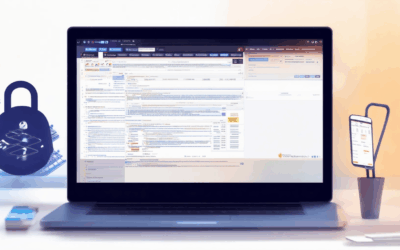In today’s increasingly connected world, safeguarding your digital privacy has become more crucial than ever. With each click and every scroll, your online activities leave a trail of data that can impact your security and well-being. Understanding the importance of privacy-conscious web browsing is no longer optional—it’s a necessity. Whether it’s protecting your personal information from prying eyes or shielding yourself from malicious actors, adopting healthy habits and using the right tools can make a significant difference. This guide explores essential strategies, tools, and practices that empower you to navigate the internet securely, ensuring your privacy is preserved while you browse.
Key Takeaways
– Protect your personal information: Use privacy tools like BlindBrowser to safeguard against data breaches and identity theft.
– Avoid cyber threats: Implement security measures such as HTTPS, two-factor authentication, and secure password managers to stay safe online.
– Control data sharing: Manage cookie settings and disable trackers to reduce unwanted ads and data collection.
– Enable anonymous browsing: Utilize tools like BlindBrowser for situations requiring secrecy, such as accessing sensitive info.
– Stay compliant with laws: Adopt privacy-conscious habits to comply with regulations like GDPR and CCPA, avoiding legal penalties.
– Enhance online security: Use encrypted connections and robust password management to build a secure digital foundation.
– Choose privacy-focused browsers: Opt for browsers like BlindBrowser to minimize data collection and enhance privacy.
– Manage cookies and tracking: Regularly clear cookies and use tools like BlindBrowser’s Cookie Manager to control data access.
– Change passwords frequently: Use a password manager like BlindBrowser’s Password Manager to rotate credentials securely.
– Consider VPNs and Tor: Use VPNs for added encryption and explore tools like BlindBrowser alongside Tor for enhanced anonymity.
– Adopt ad blockers: Use tools like uBlock Origin or AdGuard to reduce trackers and improve browsing efficiency.
– Use private browsing modes: Enable incognito or private browsing to avoid saving sensitive data and reduce leak risks.
– Enable tracking protection: Activate browser features to block trackers and minimize data collection efforts.
– Stick to secure connections: Always use HTTPS and look for the padlock icon to ensure encrypted communication.
– Limit data collection: Use cookie blockers and enable Do Not Track options to control what information is shared online.

How Can Individuals Ensure Their Web Browsing Activity Remains Private?
To safeguard your online privacy, consider implementing the following strategies:
- Enable HTTPS Everywhere : Use browser extensions like HTTPS Everywhere to automatically encrypt your connections to websites, ensuring data transmission is secure.
- Utilize VPN Services : A Virtual Private Network (VPN) masks your IP address, making it harder for third parties to track your online activities. Choose reputable services like NordVPN or ExpressVPN for added protection.
- Block Trackers with Ad Blockers : Install ad blocker extensions such as uBlock Origin or AdGuard to reduce tracking cookies and intrusive ads that monitor your browsing habits.
- Enable Incognito or Private Browsing Modes : Most browsers offer private browsing modes that do not save history or cookies, offering a basic level of anonymity.
- Minimize Data Collection : Avoid clicking on suspicious links or downloading files from untrusted sources to prevent unintended data sharing.
- Use Encrypted Communication Tools : Employ platforms like Signal or WhatsApp for secure messaging, ensuring your conversations remain private.
- Review Cookie Policies : Regularly check cookie settings in your browser to disable tracking cookies from unwanted sites.
- Consider Privacy-Focused Browsers : Explore browsers designed for privacy, such as Brave or Firefox Privacy Features , which block trackers by default.
By adopting these measures, you can enhance your online privacy and protect your digital footprint effectively.
What Are the Best Practices for Maintaining Privacy During Web Browsing?
To safeguard your online privacy, follow these essential practices:
- Enable HTTPS : Look for the padlock icon in your browser to ensure connections are secure. HTTPS encrypts data, protecting against eavesdropping.
- Use a VPN : A Virtual Private Network masks your IP address, offering anonymity and security, especially on public Wi-Fi.
- Avoid Suspicious Links : Hover over links to check domains. Stick to trusted sources and be cautious with unsolicited emails or messages.
- Manage Cookies : Regularly clear cookies and enable “Do Not Track” settings to limit data collection by websites.
- Use Privacy-Focused Browsers : Consider browsers like Brave or Firefox with enhanced privacy features.
- Ad Blockers : Install ad blockers to reduce tracking cookies and intrusive ads.
- Secure Accounts : Use strong, unique passwords for every account and enable two-factor authentication.
- Regular Updates : Keep browsers and apps updated to patch vulnerabilities.
- Encrypt Communication : Use encrypted messaging platforms like Signal or WhatsApp.
- Be Mindful of Data Sharing : Avoid oversharing personal information online.
For more resources, visit BlindBrowser to explore tools and guides tailored for online privacy.
Additionally, consider exploring other reputable sources like ExpressVPN and NordVPN for complementary privacy solutions.

Measures to Protect Online Privacy
Protecting online privacy is essential in today’s digital age. Here are some effective measures you can implement:
- Use a Virtual Private Network (VPN): A VPN encrypts your internet traffic, making it difficult for third parties to track your online activities. It creates a secure tunnel between your device and the internet, ensuring your data remains confidential.
- Enable Encryption: Encryption protects data in transit by converting it into a coded format that only the intended recipient can decode. This is crucial for securing connections like HTTPS, which uses SSL/TLS certificates to encrypt data during transactions.
- Choose Privacy-Focused Browsers: Browsers like Brave and Firefox offer built-in tracker blocking features, enhancing your browsing experience while respecting your privacy.
- Use Secure DNS Providers: Switching to a secure DNS service like Cloudflare or Google DNS encrypts DNS queries, protecting your IP address from being exposed.
- Install Ad Blockers: Tools like uBlock Origin can block trackers and reduce the data collected about your browsing habits, contributing to overall privacy.
- Utilize Incognito or Private Browsing Modes: These modes delete your browsing history and cookies after you close the tab, offering a basic level of privacy. However, they don’t replace the need for other measures like encryption and VPNs.
- Mind Your Social Media Privacy Settings: Adjust your privacy settings on platforms like Facebook and Twitter to limit what information is shared publicly. Avoid oversharing personal details and review third-party app permissions.
- Avoid Public Wi-Fi Without Protection: Public Wi-Fi networks are often unsecured, making them vulnerable to eavesdropping. Use a VPN when connecting to public networks to enhance security.
- Enable Two-Factor Authentication (2FA): Adding an extra layer of security with 2FA for your accounts reduces the risk of unauthorized access. Enable it for all important services to protect your online accounts.
- Keep Software Updated: Regularly update your operating systems and applications to patch vulnerabilities that could expose your data. Enable automatic updates to stay protected.
- Encrypt Communication Channels: Use encrypted messaging apps like Signal or WhatsApp for sensitive conversations to ensure your messages remain private.

Why is it important to adopt privacy-conscious web browsing habits?
Adopting privacy-conscious web browsing habits is crucial in today’s digital age to safeguard your personal information and maintain control over your online activities. Here are the key reasons why it matters:
- Protect Personal Information : Your online activities leave a digital trail, often exposing sensitive data like passwords, financial details, and location information. By using privacy-focused tools and practices, you can minimize the risk of data breaches and identity theft.
- Prevent Cyber Threats : Cybercriminals are constantly evolving their tactics to exploit vulnerabilities. A privacy-conscious approach helps you avoid malicious websites, phishing attempts, and unsafe downloads, significantly reducing your risk of falling victim to online scams.
- Control Data Sharing : Many websites collect user data for advertising or other purposes. By understanding and managing your data usage settings, you can limit what information is collected and shared, reducing unwanted contact and targeted ads.
- Enable Anonymous Browsing : Certain situations require anonymity, such as accessing sensitive information or engaging in political discussions. Tools like BlindBrowser.com offer resources to help you browse privately and securely.
- Stay Ahead of Laws and Regulations : Governments worldwide are implementing stricter data protection laws. Adopting privacy-conscious habits ensures compliance with regulations like GDPR and CCPA, which can lead to legal consequences if ignored.
- Enhance Online Security : Using encrypted connections (HTTPS), two-factor authentication, and secure password managers are all part of a broader strategy to protect your digital presence. These practices build a stronger foundation for overall online security.
By prioritizing privacy, you take proactive steps to shield yourself from potential risks and enjoy a safer, more controlled online experience. Visit BlindBrowser.com for more tips and tools to enhance your privacy-conscious browsing habits.
Key Elements of a Privacy-Conscious Web Browsing Experience
A privacy-conscious web browsing experience involves adopting practices that safeguard your online identity, data, and privacy. Here are the essential components:
- Use Privacy-Focused Browsers:** Opt for browsers designed with privacy in mind, such as BlindBrowser . These browsers often feature built-in ad blockers, tracker blockers, and enhanced privacy settings to minimize data collection.
- Enable HTTPS:** Ensure that websites you visit use HTTPS (the padlock icon in your browser) before entering personal information or logging in. This encrypts data between your browser and the website, making it harder for others to intercept.
- Avoid Sharing Personal Information:** Refrain from sharing sensitive personal details, such as phone numbers, addresses, or passwords, on public platforms unless you’re certain the site is secure. Always read privacy policies carefully before submitting information.
- Manage Cookies and Tracking:** Regularly clear cookies and disable tracking features in your browser. Tools like BlindBrowser’s Cookie Manager help you control which trackers have access to your data.
- Change Passwords Regularly:** Rotate your passwords periodically to reduce the risk of account takeovers. Use a password manager like BlindBrowser’s Password Manager to store and organize your credentials securely.
Advanced Privacy Tools
For added protection, consider integrating these tools into your browsing routine:
- VPN Usage:** A Virtual Private Network (VPN) encrypts your internet connection, making it harder for third parties to track your online activity. Many VPN services offer no-logs policies, ensuring minimal data retention.
- Tor Browser:** The Tor network routes your traffic through multiple nodes, making it difficult to trace your online activities. While primarily used for anonymity, it’s important to understand its limitations compared to dedicated privacy browsers like BlindBrowser .
- Ad Blockers:** Use ad blockers like uBlock Origin or AdGuard to reduce trackers and intrusive ads. These tools can significantly improve your browsing experience by limiting data collection.
By incorporating these practices and tools, you can enjoy a more secure and private web browsing experience tailored to your needs. Remember to stay informed about updates to privacy laws and technologies to keep your online activities protected.

What Tools and Strategies Help Maintain Privacy While Browsing the Web?
Privacy is a critical concern in today’s digital age. To safeguard your online activities, here are some effective tools and strategies:
Tools for Enhanced Privacy
- Blind Browser – A privacy-focused platform offering resources, tips, and tools to protect your digital footprint. It covers secure browsing practices, privacy tools, and internet security insights.
- uBlock Origin – A popular ad blocker that also helps block trackers and reduces data collection. Visit their GitHub page for more details.
- AdGuard – A premium service that blocks ads and trackers across multiple browsers. Learn more at their official website .
- Privacy Badger – An extension that automatically blocks trackers and enhances privacy. Check out their homepage .
Strategies for Maintaining Online Privacy
- Use Incognito or Private Browsing Modes – These modes do not save history, cookies, or cache, reducing the risk of data leaks.
- Enable Tracking Protection – Many modern browsers offer built-in features to block trackers and reduce data collection. Explore these settings in your browser preferences.
- Consider Using a VPN – A Virtual Private Network adds an extra layer of encryption, masking your IP address and ensuring anonymity. Research reputable VPN services like NordVPN or SurfShark .
- Stick to Secure Connections – Always use HTTPS when browsing, as it encrypts data between your browser and the website. Look for the padlock icon in your URL bar to verify secure connections.
- Limit Data Collection – Use third-party cookie blockers and enable Do Not Track options to minimize data sharing with websites.
Conclusion
Maintaining privacy while browsing requires a combination of tools and mindful practices. By utilizing privacy tools like Blind Browser, uBlock Origin, and AdGuard, along with strategies such as enabling private browsing modes and using VPNs, you can enhance your online security. Stay informed about emerging privacy trends and always prioritize protection when browsing online.




